November 20, 2025. Lecture at Dongjak District Office, Lecture at Dongguk University, Book Launch Party for “Blue Korean Language Collection”
Hello. Today, Sunim gave a lecture at Dongjak District Office in the morning, held a Dharma Q&A at Dongguk University in the afternoon, and attended the book launch party for “Blue Korean Language Collection” in the evening.

After completing morning practice and meditation, Sunim headed to The Peace Foundation. He started the day’s activities with a breakfast meeting with North Korea experts at 7 AM.
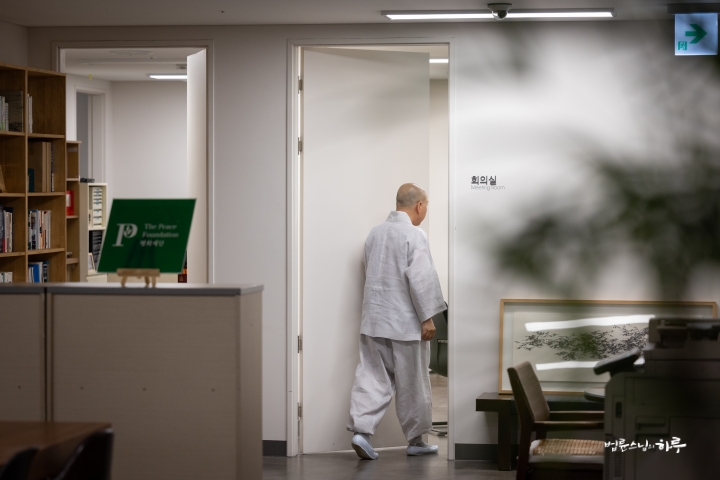
After exploring North Korea’s prices and exchange rates, market trading conditions, and prospects for improving North Korea-US relations, the meeting concluded.
Sunim immediately departed from Seoul Jungto Social and Cultural Center at 9:10 AM to give a lecture at Dongjak District Office. The district office had long requested a lecture for district employees and residents under the title “Dongjak Citizens’ University with Venerable Pomnyun Sunim,” and today he made time to deliver the lecture.

When Sunim arrived at Dongjak District Office, about 360 residents welcomed him with loud applause and cheers.
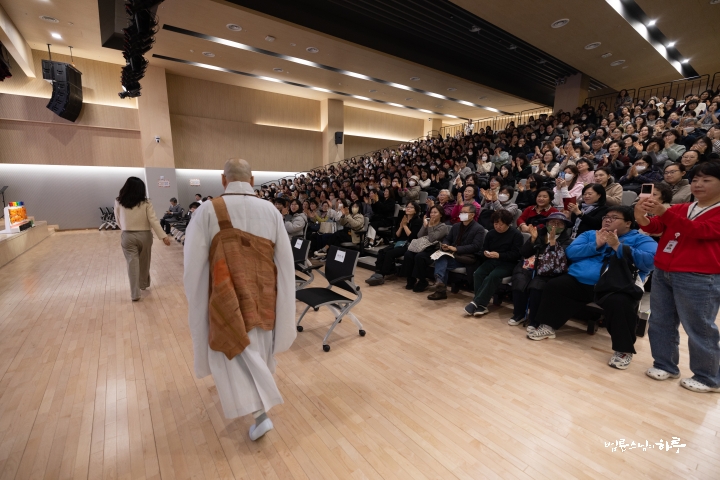
First, the district mayor gave a welcoming speech, followed by a commemorative photo.

Sunim immediately took the stage and began a dialogue with the residents. During the 90-minute session, six people raised their hands and shared their concerns with Sunim.

One of them sought advice on how to reduce nagging their children, asking how to break the habit of nagging that repeats itself.
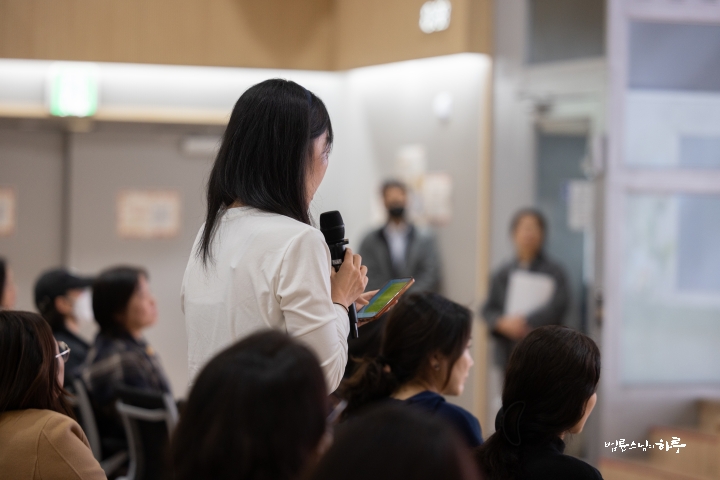
Don’t Nag, I Said, but I Did It Again. How Do I Break This Vicious Cycle?
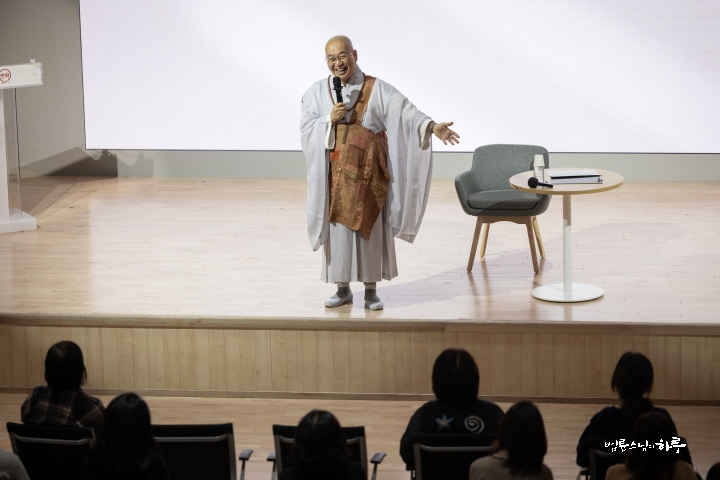
“There is no such method. Because your words are premised on the idea that ‘a mother can’t not nag.’ You say nagging is a problem, while simultaneously saying you can’t not nag. Does this mean you want to change? Or that you don’t want to change? The reason I say there’s no method is because you’re thinking ‘I won’t change.’ It’s difficult to change even when you’re firmly determined to change, but it’s even harder if you don’t intend to change. It’s like an alcoholic asking, ‘Is there a way to reduce drinking?’ There’s no such method. Once you put alcohol to your lips, you’ll keep drinking.”
“If you tell me how to stop nagging, I’ll try to change.”
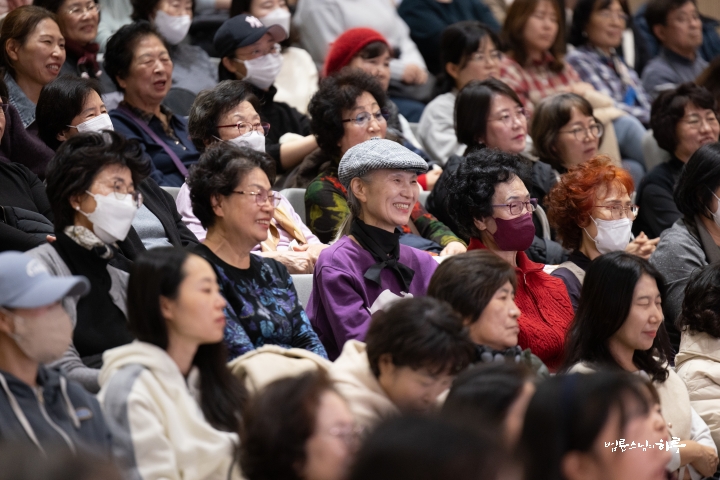
“Nagging is when you speak out of your own emotions even though it has little or no educational effect. Telling a child who has fallen to ‘Be careful!’ or ‘Get up!’ is not nagging. Telling a husband who comes home drunk ‘Don’t drink!’ is nagging. I asked someone who nags her husband, ‘Do you think your husband will change if you tell him not to drink?’ Her answer was ‘No.’ She keeps saying it because of her own emotions even though she doesn’t think it will change him. That’s nagging. It means it has no effect. If you know it has no effect but keep repeating the behavior, it’s your problem, not your husband’s or other family members’ problem. In other words, it’s a problem with your own habits.
So when did this habit of mine develop? Perhaps you learned it from your mother too. You didn’t like hearing your mother’s nagging when you were young, but you learned to follow it. This is called family tradition. When children are young, they really hate their father drinking, but when they grow up, they drink like their father. This is family tradition. Do you think you inherited it from your mother? Or did your mother never nag and it’s just you?”
“It’s definitely been passed down from my mother.” (laughter)

“In that case, you need to choose one of two paths. First, ‘I inherited nagging from my mother, but my mother lived well after having me, and I’m living well after having children,’ ‘That level of nagging is no big problem to live with. Our children will live well when they grow up too.’ This is a way to live comfortably without thinking that nagging is wrong. Because there’s no perfect mother. A mother gives to her children. She gives good influences but also bad influences. But what if you try to give absolutely no bad things and only good things? That goal is too high and difficult to maintain. It’s good to fix the nagging habit, but there’s also a way to live thinking ‘Even so, our children will live well’ even if the habit doesn’t change.
Second, conversely, if you think ‘My mother’s nagging was a big wound to me as a child, and I will absolutely not pass it on to my children,’ you need firm determination. But since you think mothers can nag and just wish to nag a little less, that’s why I said there’s no method. If you’re really determined, you need to firmly decide that even if you can’t prepare meals or buy clothes, you absolutely won’t nag. Especially, you must never pour out your emotions on your children.
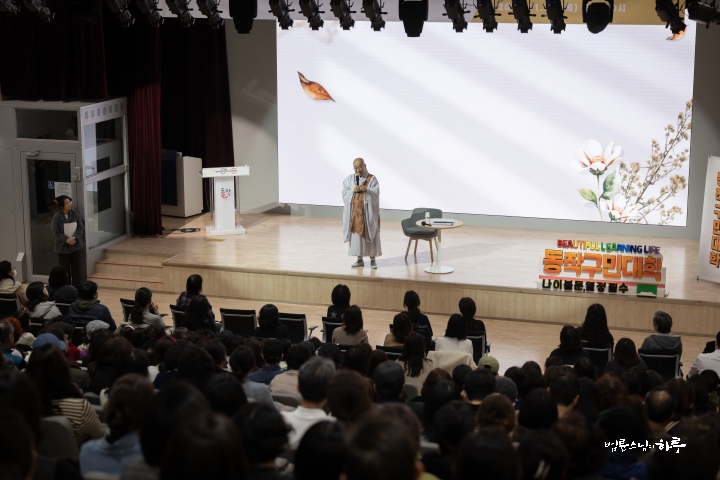
If you keep repeating such behavior despite your resolve, then you need to give yourself a penalty. For example, ‘Every time I nag, I’ll do 1,000 prostrations of repentance.’ The first few times, even after doing 1,000 prostrations, it’s hard to change. But when this is repeated about ten times, a change occurs. It takes at least three hours to do 1,000 prostrations. After the first 1,000, you can barely walk. But when this is repeated about ten times, even as the urge to nag rises in your consciousness, the thought ‘Oh, I’ll have to do another 1,000 prostrations’ comes up with it. Then the nagging impulse stops before it leaves your mouth.
If you keep scolding children, at first they’ll listen out of fear, but over time it becomes routine for them. It becomes chronic. Then it loses all effectiveness. The children start thinking, ‘I’ll just get scolded once, so what…’ You’ve probably experienced this at work too – when your boss keeps saying the same thing, it starts to sound like nagging. It’s the same between spouses. When words are constantly repeated, at some point you think, ‘I’ll just listen to some nagging…’ and let it pass. Once the other person perceives it as nagging, those words no longer have any effect. And for children, such words become wounds. The bigger problem is not that they’re ineffective, but that they cause harm.
That’s why it’s better not to nag. But even when you try not to, it’s difficult. In such cases, you need to give yourself a penalty. The penalty needs to be strong enough to create awareness in your unconscious mind. Just thinking about it should give you chills. That’s what it takes to change. On the other hand, you might think, ‘Do I really need to go to such lengths to change?’ In that case, accepting ‘It’s okay to just live as I am’ is also an option. I live this way, my mother lived this way, and the generations before us lived this way too. This is our family legacy.
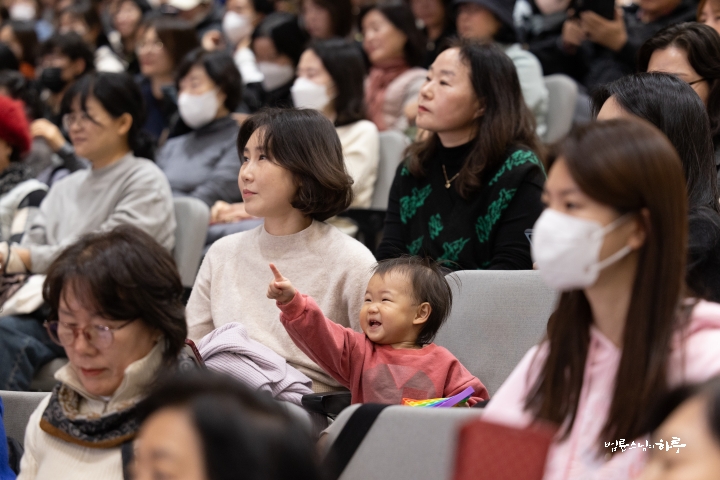
Just as different regions have different temperaments, these tendencies are passed down like genetics. This is because our consciousness, like biological inheritance, is learned and transmitted. That’s why habits are so difficult to change. They are so difficult to change that people in the past called this ‘fate.’ They even said that personality is predetermined at birth. That’s why there are sayings like ‘You can’t change your nature’ and ‘If your nature changes, your days are numbered.’ This shows how difficult it is to change. However, the Buddha examined this deeply and clearly stated that personality is not innate but formed habits. Habits can be changed, but it’s just very difficult to do so. That’s why the most important virtue in practice is ‘consistency.’ Just as water drops can pierce through rock, you must be persistent. Just as repetition is needed to form habits, repetition is also needed to change them. You need to maintain awareness consistently to change. It doesn’t change immediately just by trying hard once or twice. But listening to what you just said, it seems you have a bit of an attitude of ‘Is it really worth going to such lengths to change?’
This is how Jesus and Buddha differ from us. Jesus was born as a carpenter’s son but was reborn as the Son of God through 40 days of fasting in the wilderness. One day, he realized, ‘I am the Son of God.’ Buddha was reborn from an ordinary being to Buddha through six years of ascetic practice. We too can be reborn like them. However, it’s not easy. Most people just live according to how they were made.

Ultimately, there are two paths. First, if you want to change your habits, you need a firm attitude and consistency. Second, if you don’t want to change your habits, it’s fine to live as you are. However, if you choose to live as you are, you must know how to apologize. If you burst out in anger, you should immediately say, ‘I’m sorry. I have a bad temper.’ If you get angry and then say, ‘When did I get angry? Don’t you get angry too?’ the relationship will deteriorate. But if you quickly say ‘I’m sorry,’ it becomes bearable to live together. You can also tell your child, ‘Mom nagged again, I’m sorry.’ Just live as you are and accept the consequences. If the consequences result in too great a loss, then you need a firm attitude and continuous effort to change your habits. We say it’s our destined fate, but actually, everything has been formed. Because it has been formed, it can be changed. It’s just a bit difficult to change.”
“Thank you. I understand well.”
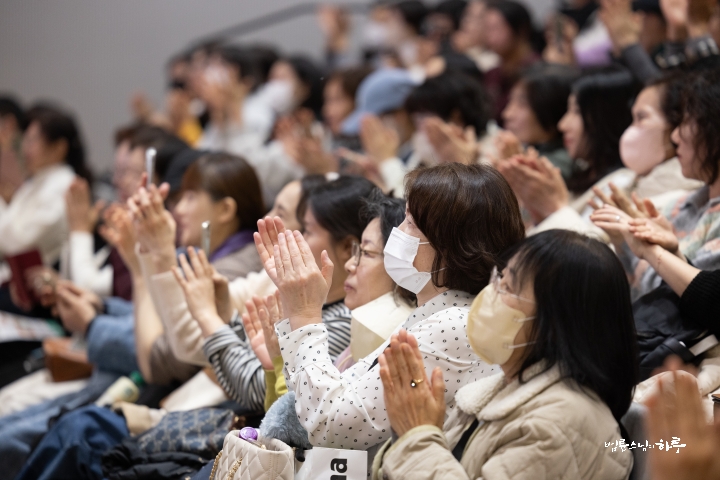
Questions continued to follow.
I’m upset about the repeated mistakes and attitude of a foreign part-time worker. Am I bad at managing people?
I’m planning to quit after maternity leave and start something new. How can I overcome my fear?
My face turns red frequently, making interpersonal relationships difficult.
I made herbal medicine for my husband who drinks every day for his health, but he takes the medicine and continues drinking, which worries me.
After being disappointed by people, I cut off relationships and now feel lonely and anxious. What should I do in this situation?
After answering all the questions, Sunim gave his closing remarks.
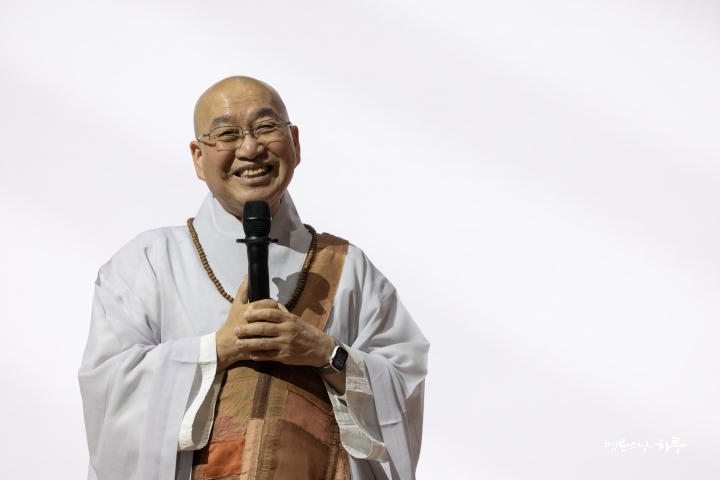
“Looking at the big picture, life is not a big deal. In our ordinary daily lives, we just need to do what needs to be done appropriately. Just as being healthy means not being sick, happiness is not about being joyful but about not suffering. With this perspective, anyone can live happily. I hope all of you live happily.”
The lecture ended with loud applause.
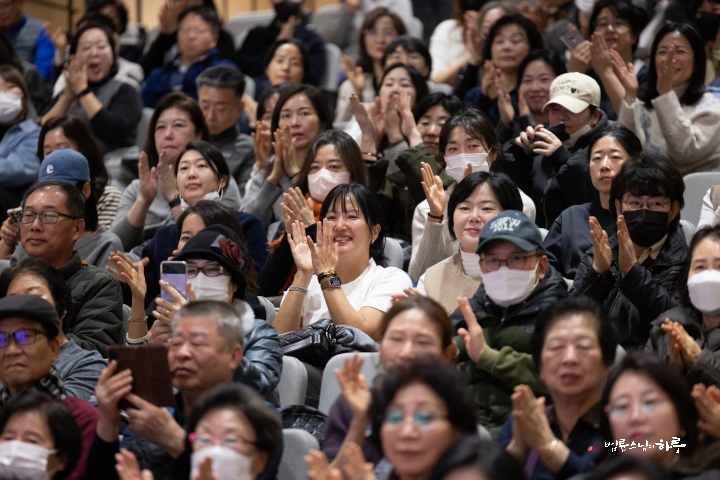
After leaving Dongjak District Office, Sunim returned to Jungto Social and Cultural Center for lunch. After finishing his meal, he headed to Dongguk University at 1:50 PM.

Upon arriving at Dongguk University, Sunim had a brief tea conversation with Venerable Jejeong, the director of Jeonggakwon. At 3:00 PM, he headed to Namsan Hall in the main building where the lecture was to be held.
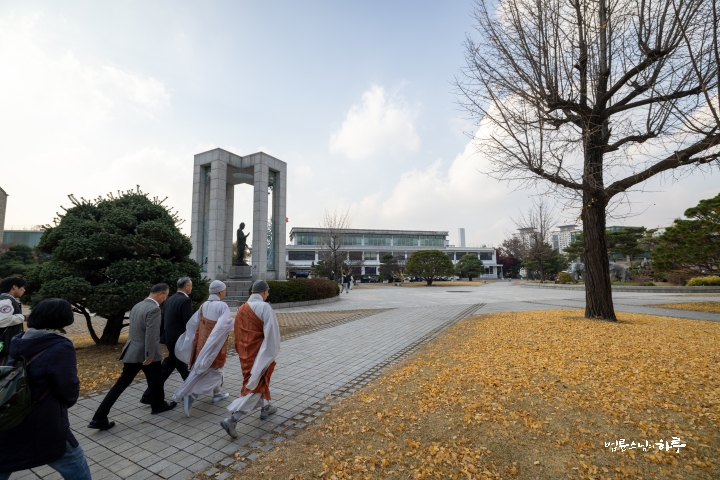
Last month, Dongguk University President Yoon Jae-woong visited Jungto Social and Cultural Center and requested Sunim to give a Dharma talk for Dongguk University students and staff. As today happened to be the day of the regular Dongguk community Dharma assembly, Sunim made special time for it.
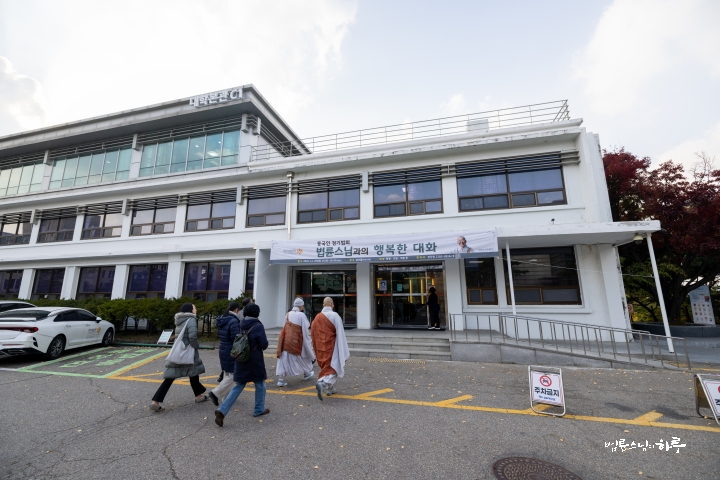
About 200 staff members and Buddhist club students filled the lecture hall. When Sunim came down the central stairs, they welcomed him with loud applause.
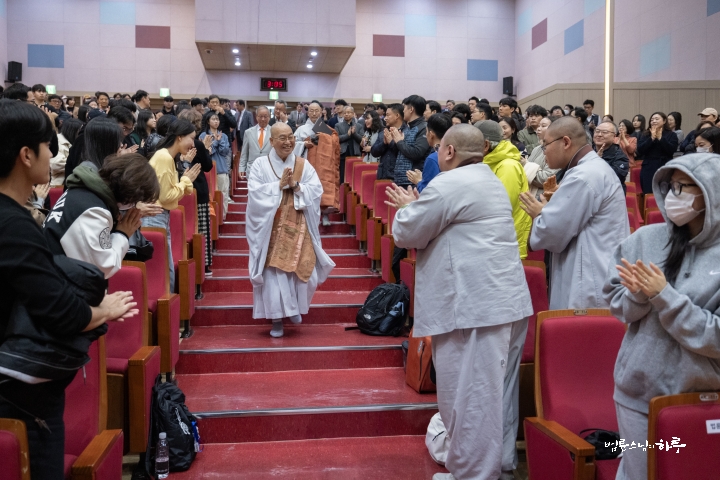
After reciting the Three Refuges and the Heart Sutra, Venerable Jejeong, director of Jeonggakwon, introduced Sunim’s activities in detail. Then Sunim took the stage and began his dialogue with the audience.

After Sunim briefly introduced the purpose of the Dharma Q&A, anyone could raise their hand and ask questions. Most of the questions came from students involved in Buddhist club activities.
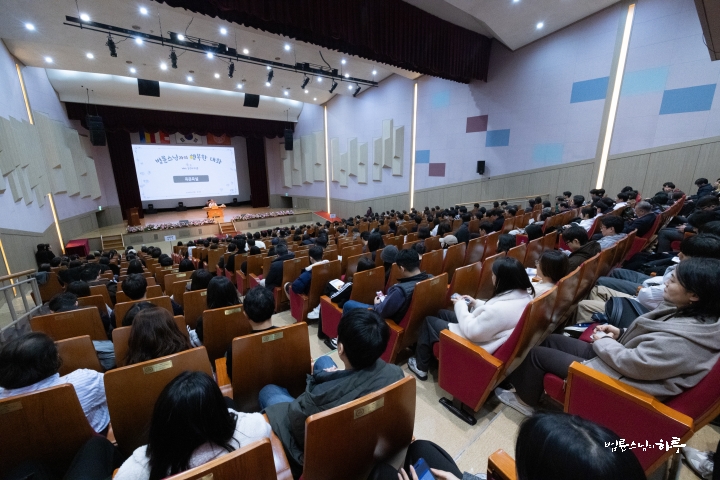
For an hour and a half, eight people shared their concerns and had conversations with Sunim. One of them asked about how to maintain self-control thoroughly.
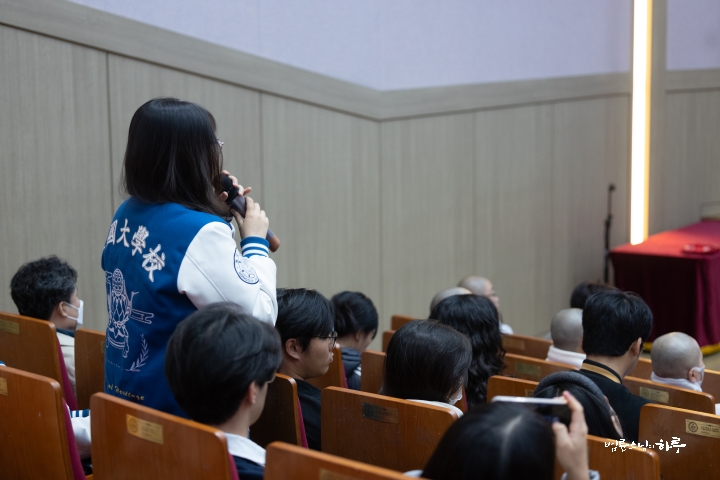
Is There a Way to Maintain Self-Control to the End?
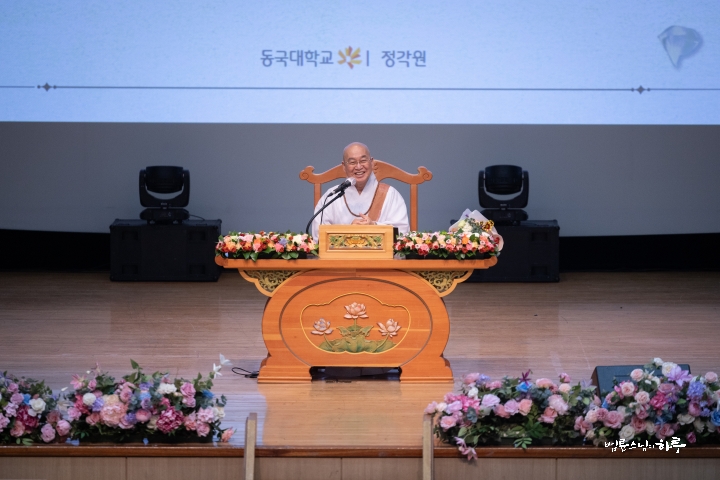
“Both are difficult to achieve. The best method is not to think about ‘controlling yourself.’ Because you decide to practice self-control, you actually fail at it and suffering arises. So let go of the thought ‘I will control myself.’ Then the suffering disappears. Instead, consequences will follow. Then you can willingly accept those consequences. If you want to eat, eat and gain weight. But the problem is that you ultimately regret ‘what you chose.’ That’s why self-control is necessary. If you made a choice, willingly accept the consequences, and if you don’t like the consequences, think ‘It’s harmful, so I won’t do it’ and don’t create the causes.
In practice, we usually teach ‘Don’t create causes to avoid consequences.’ So most people misunderstand and resist, saying ‘Why can’t we do what we want?’ or ‘Buddhism always tells us to endure.’ That’s why I say, ‘If you want to do it, do it and go to prison!’ ‘If you want to eat, eat and die!’ This is also a form of practice. Practice isn’t just about not doing something; willingly accepting the consequences after doing something is also practice.
The core of practice is a state without suffering. If you want to borrow money by your own choice, go ahead and borrow. But you have to pay it back with interest. If paying it back is too difficult, then next time, even if you want to borrow, don’t. You shouldn’t say that ‘wanting to borrow’ itself is bad.
This is what the Buddha’s teaching originally was. Let’s say there’s delicious food here. You want to eat it, but the Buddha says, ‘There’s poison in it.’ What would you do?”
“I probably wouldn’t eat it.”
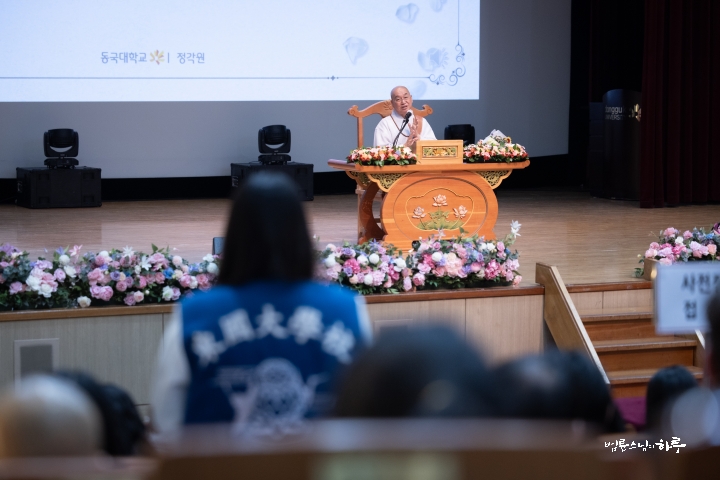
But some people ask, ‘What should I do when I’m hungry? How can I not eat when I want to? Can’t I just eat a little?’ The Buddha might say, ‘Still, don’t eat it!’ but I say, ‘Fine, then eat it and die!’ It’s their choice. If they thought eating would be good but the result is bad, they’ll have regrets. That’s ignorance. But if they eat knowing ‘eating will kill me,’ even if the result is death, it’s their choice.
The reason Buddhism keeps becoming more like ethics is because it emphasizes ‘Don’t eat!’ rather than the truth that ‘It’s poisoned.’ The Buddha only stated the fact that ‘It’s poisoned.’ He didn’t tell people what to do about eating or not eating. He meant for people to judge for themselves and do as they see fit. That’s the original Buddhist teaching. But as time passed, Buddhism changed to be like ethics, which is why there’s resistance. People say, ‘If I want to eat, I should be able to eat. Why are you stopping me?’ Most people, when told food is poisoned, will throw it away no matter how good it smells. But some keep asking, ‘How can I not eat when I want to?’ Most of your questions are like that. That’s why I say, ‘Fine, eat it and die!’
There’s no ‘self-control’ in practice. Self-control is ‘wanting to eat but not eating because it’s poisoned’ or thinking ‘Can’t I just eat a little?’ But a wise person, knowing it’s poisoned, simply doesn’t eat. There’s no need to ask ‘How can I not eat?’ For example, you pick up something red and pretty, but it turns out to be a ball of fire. Holding the fireball, you scream that it’s hot and ask, ‘It’s hot, what should I do?’ When told to put it down, you ask, ‘How do I put it down?’ How should you put it down?
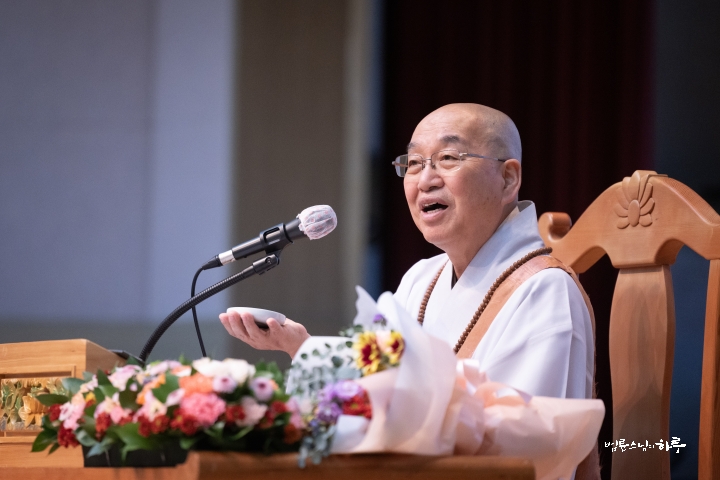
“If it were me, I think I would throw it away.”
“Asking how to let go of a hot fireball is another expression of the desire to hold onto it. In everyday life, when something is hot, we just let it go. If someone asks how you let it go, what would you answer? You’d simply say you just let it go. When it’s hot, you go ‘Hot!’ and just let it go. In sophisticated terms, this is called ‘banghachak’ (放下著) – letting go. It’s simply letting go, not discussing methods of letting go – that’s not Seon. But when people say the fireball is hot and ask ‘How do I let it go?’, if I tell them to put it in their left hand when their right hand is hot, they welcome this as a ‘good method.’ Because they can hold onto the fireball a little longer. But soon the left hand gets hot too. When they ask ‘What should I do now?’, I tell them to put it on their foot next. After going through about five stages like this until they finally put it on the ground, is this a good method?”
“It doesn’t seem like a good method.”
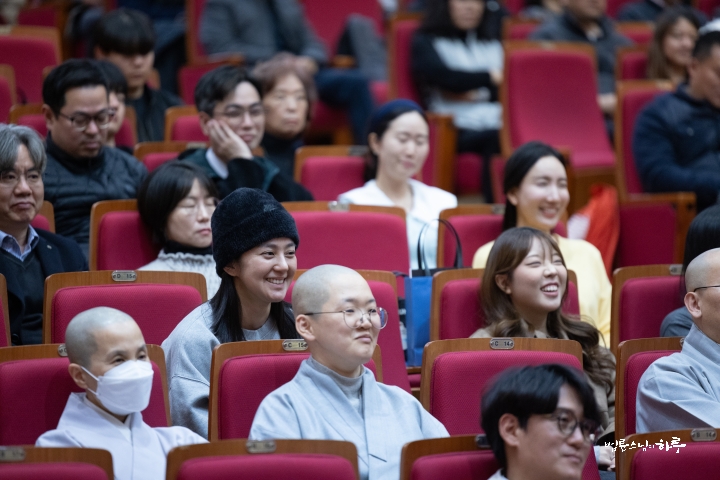
“Strictly speaking, restraint is not practice. Restraint is a concept of ethics. It’s enduring. How can you get up when you don’t want to? If I’ve decided to get up, I just get up immediately. Even if you resolve a hundred times ‘I should get up…’, you’ll still be lying down. Instead of making resolutions, when the bell rings, you should just get up. You just ‘pop’ up. That’s why in practice we say ‘Just try it.’ The difficulty exists in our thoughts, not in the action. What do you want to restrain?”
“I’m a bit stubborn.”
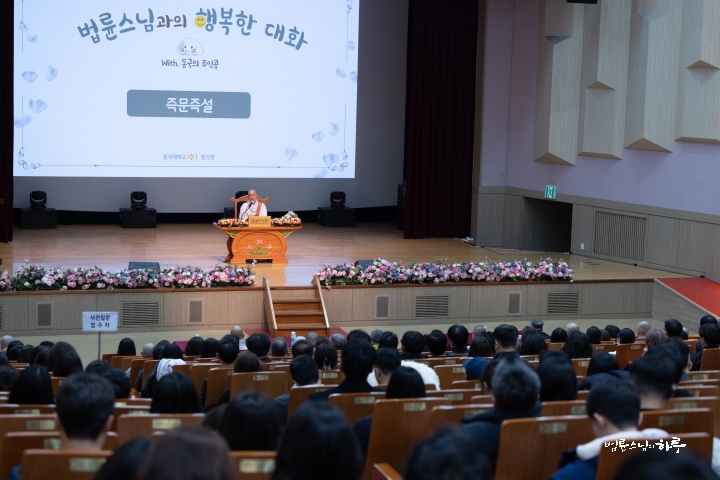
“You become stubborn because you think you’re right. If you know that you and the other person think differently, there’s no reason to be stubborn. ‘Oh, you think that way? I think this way.’ ‘You believe that? I believe this.’ ‘You like that? I like this.’ You can just express your opinion like this. I’m not saying to give up your opinion. Insisting that you’re right and the other person is wrong is stubbornness. The truth is that we’re just different. So when you know the truth, there’s nothing to be stubborn about. Saying there’s nothing to be stubborn about doesn’t mean I have no opinion – it means acknowledging our differences.
‘Want to go eat jjajangmyeon?’ ‘No, I want jjamppong.’ Let’s say your opinions differ like this. If you’re a couple, you can coordinate – eat jjajangmyeon today and jjamppong tomorrow. If you can’t reach an agreement, is that a problem? No. At the same Chinese restaurant, you can eat jjajangmyeon and I can eat jjamppong. But what if one person wants bibimbap and the other wants jjamppong? Then you can eat separately and have coffee together at a café. Reaching an agreement isn’t the only solution. Acknowledging differences and coordinating, or not compromising, are also methods. Because we’re attached to the idea that we must coordinate, we think it’s a problem when we can’t. Even if you can’t coordinate, it’s not a problem. Doing things separately is also a way of coordinating. This isn’t a failure to agree between two people.

Don’t try to restrain yourself, and don’t try to endure it. Trying to suppress anger that has already arisen to prevent it from showing outwardly is a matter of ethics. Practice is simply being aware when anger arises, thinking, ‘Ah, anger is arising.’ Anger arises from the attachment that ‘I am right.’ To put it bluntly, it’s a symptom of madness. Realizing that anger is a symptom of madness is awakening. However, even if you know this, if you fail to be aware at the moment anger arises, it will manifest outwardly. It’s not enough to have the awakening or wisdom that anger is a symptom of madness; you must be aware of the anger arising in this very moment.
Not knowing that anger is a symptom of madness is called ‘fundamental ignorance.’ Not being aware of the moment anger arises is ‘momentary ignorance.’ Even after overcoming fundamental ignorance, momentary ignorance still arises habitually. That’s why awareness is necessary. Since the realization that anger is a symptom of madness is already established, the anger disappears the moment you become aware of it arising. However, those who say, ‘I’m aware of it, but the anger still rises,’ have not yet overcome their fundamental ignorance. Because they’re justifying their anger, the anger continues to rise even when they’re aware of it.
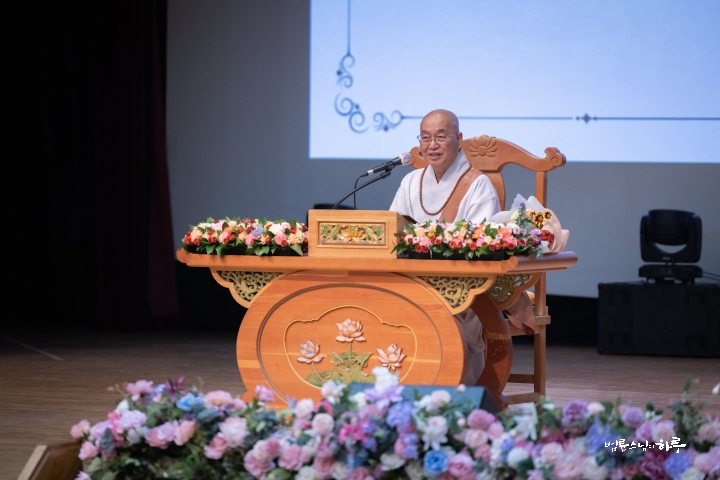
The key is not endurance, but ‘awareness.’ It’s okay if you lose awareness. When you focus on endurance, you fall into regret and suffering, thinking, ‘Oh, I couldn’t endure it again,’ or ‘I got angry again.’ However, even if you express anger outwardly because you failed to be aware of it, you simply lost awareness—you didn’t do anything wrong. If you realize, ‘Oh, I missed it. I should try not to miss it next time,’ there is no regret or suffering. When you become aware of anger as it arises, you don’t express it outwardly. If you’ve already expressed anger, you can become aware of it afterward and say, ‘I’m sorry,’ and repent.
So rather than asking ‘How can I endure?’ you should adopt the perspective of ‘How can I be aware of this state as it is?’ This is because endurance causes stress. Not expressing anger benefits others, but it causes great suffering to yourself. From an ethical perspective, causing others pain for your own comfort is considered bad behavior, while causing yourself pain for others’ sake is called sacrifice and is considered good behavior. However, from a practice perspective, both are equally ways of maintaining suffering. That’s why ethical goodness is not considered practice—because it remains in a state of suffering. Instead of looking for ways to endure, you should move toward awareness, thinking, ‘Oh, this is how I am,’ or ‘This is my current state.’ This way, self-deprecation disappears.”
“Thank you.”
Questions continued to follow.

I’ve always been rushing to achieve something, so I feel anxious when I’m just standing still. How should I manage this feeling?
When I’m angry, it seems unclear what level of issues I should respond to and what I should just let go. The criteria seem ambiguous.
As a working mom, I sometimes miss preparing homework or school supplies, and then I get calls from school. When that happens, I blame myself and feel bad. What should I do in these situations?
I’ve been living a harder life than others since childhood. My concern is that I resent my situation by comparing myself to others. How can I escape from these thoughts?
I feel so lonely. No matter how many people I meet, when I come home and am alone, I constantly feel empty. Is there a way to manage loneliness?
How can I manage my anger without being hurt by others’ rude words and actions?
I want to make Master Domun’s story of ‘The Pine Tree in Front of the Pagoda’ my life’s guideline. But I keep blaming conditions, parents, and environment. How can I manage this blaming mind?
As they continued their conversation, it was already time to wrap up. Sunim gave his closing remarks.
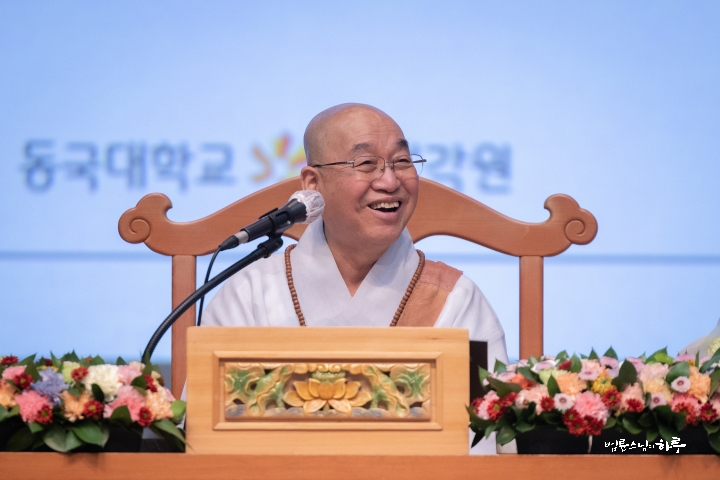
“From what the president said today, I heard that about 3,000 students at Dongguk University have taken the Five Precepts this time. When studying at Dongguk University, not any other university, I think it would be good to form a connection with the Dharma at least once. As the world changes and you get older, you might regret thinking, ‘I wish I had been more interested in Buddhism when I was in school…’ Since the school is providing such a good opportunity, I hope you make good use of it.”
The lecture ended with loud applause.
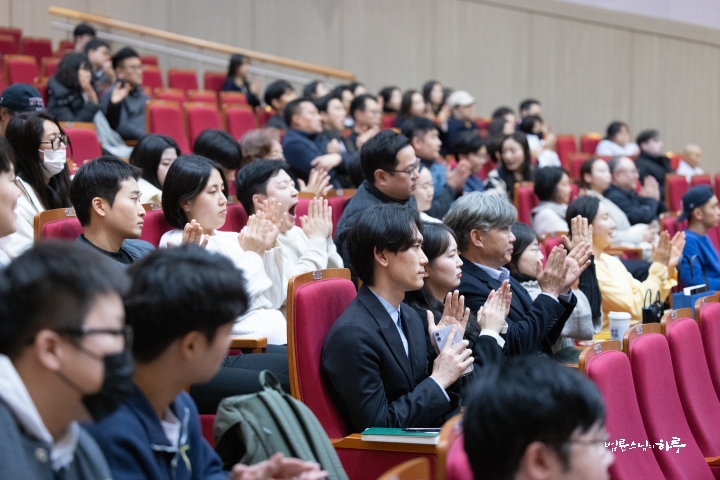
Sunim left the lecture hall as the audience stood and applauded.

He immediately moved to the Dongguk University Chairman’s office and had tea with Chairman Dongwan Sunim. President Yoon Jae-woong and university officials also joined them.

Sunim shared the results of the recent Youth Festival held at the Jungto Social and Cultural Center. In response, Dongwan Sunim suggested it would be good to move the venue to Dongguk University in the future to create a Youth Festival with even more young participants. After mutually acknowledging the need for more frequent exchanges and cooperation for youth dharma propagation, they concluded their tea meeting.

As the sun set, Sunim returned to the Jungto Social and Cultural Center.
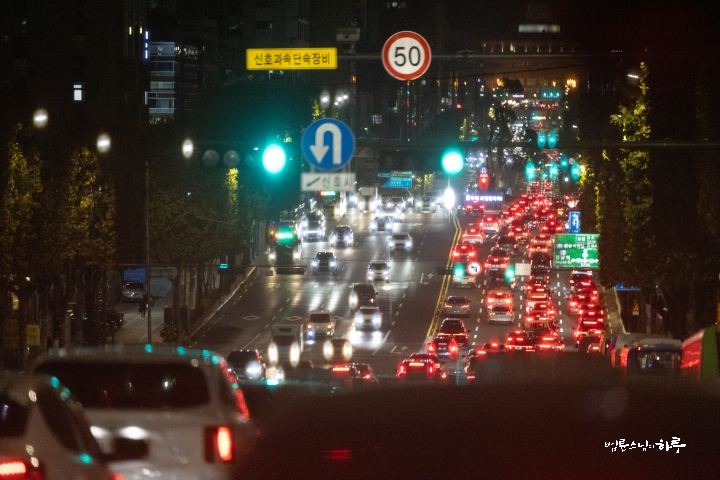
At the first-floor entrance, Ms. Choi Han-sil was warmly welcoming citizens who came for the book celebration of “Blue Korean Language Collection.” After greeting Ms. Choi Han-sil, Sunim had dinner with her.
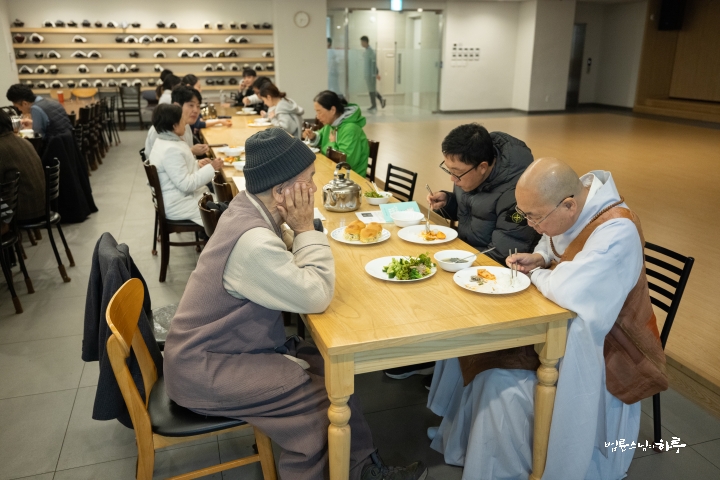
Before starting the book celebration, he talked with today’s host, Kim Je-dong, about the movement to preserve the Korean language. At 7:30 PM, they headed together to the underground auditorium.
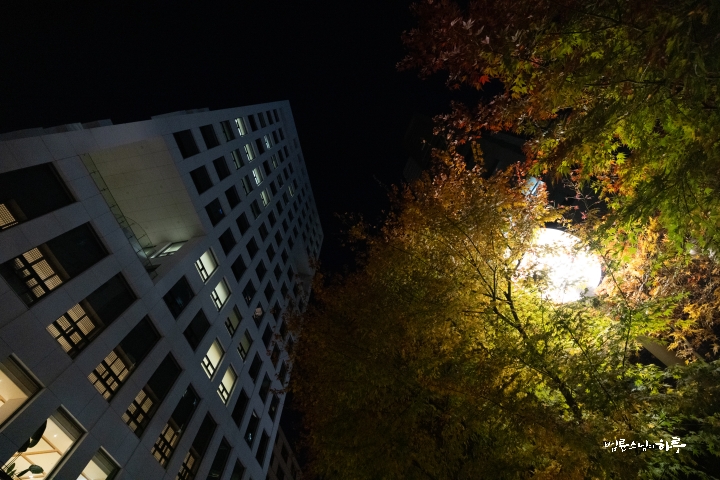
About 200 citizens interested in preserving the Korean language were seated in the underground auditorium. Following Kim Ra-gyeol’s opening performance, Sunim took the stage and welcomed the attending citizens with opening remarks.
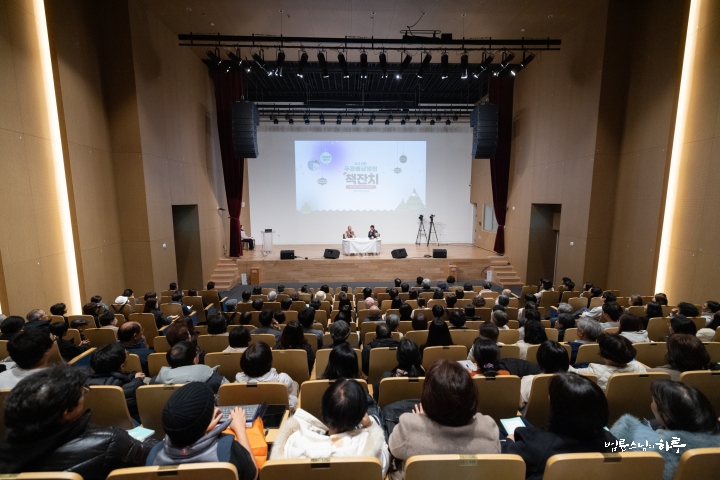
“First, I sincerely welcome everyone who has come here today. I hope you receive many blessings for attending this event. (Laughter)
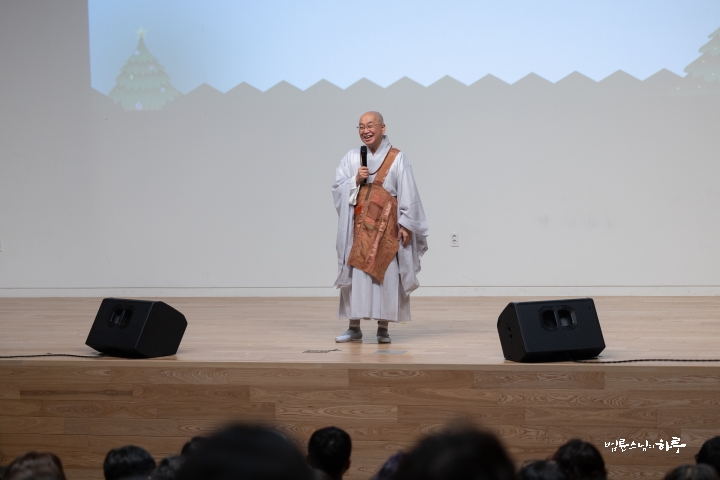
These days, Korean culture is having a tremendous influence worldwide. We who live in Korea may not realize it, but when you actually go abroad, the situation is completely different. The number one contributor to this cultural influence seems to be dramas. Even in rural villages abroad, people watch many Korean dramas. And K-POP is influencing the younger generation. But I think dramas have more influence than songs. This is because people watch the food and clothes in dramas and follow them, creating trends. As a result, Korean restaurants are also doing well. Even in tiny shops covered in dust in mountain villages in Bhutan, there are all kinds of Korean alcohol and ramen that even I don’t know well. This is how Korean culture is spreading worldwide.
Korean Language Being Learned Worldwide, Yet We Are Forgetting Our Own Language
When I meet people abroad, very elderly people speak in local languages that I can’t understand, and those who received Western education and can speak English say ‘Thank you!’ But excluding them, most children and women say ‘Gamsahamnida’ (Thank you) and ‘Annyeonghaseyo’ (Hello) in Korean. When passing through immigration or sitting in restaurants, they come up and greet me with ‘Annyeonghaseyo.’ It seems our language has spread that much. The number of people wanting to learn Korean has now grown to be the second or third highest in the world after English. At a U.S. Navy base on the coast below San Francisco, where they provide language education to American soldiers, there weren’t many American soldiers learning Korean before, but now there are so many they can’t handle them all. This has happened without us even knowing.
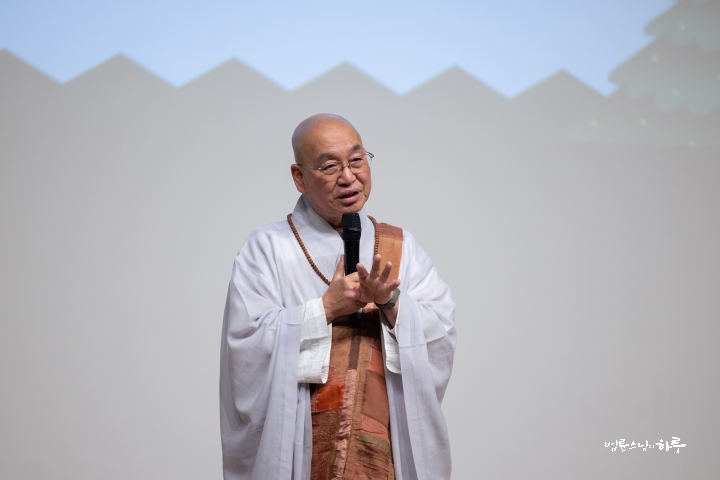
As a result, young people from other countries now dream of visiting Korea, and living in Korea has become their wish. This situation is rapidly changing. Furthermore, with the recent popularity of the animated film ‘K-pop Demon Hunters,’ Korean cultural elements like tigers and traditional hats (gat) are becoming known worldwide. Until now, we have been learning pop songs from other countries and instruments like the violin or guitar, but now foreigners are eager to learn our culture instead.
In this situation, I think it would be better for us to have some pride rather than being too intimidated and just following other countries. These days, songs mix English and Korean lyrics. When you go abroad now, you can hear children singing with Korean words like “Gwaenchana! Gwaenchana!” (It’s okay! It’s okay!). I wondered if this was English or what language it was, but it turns out Korean words were included in the song lyrics. They were singing in Korean.
While these changes are happening, what concerns me slightly is that the words foreigners hear most often – “gamsahamnida” (thank you) and “annyeonghaseyo” (hello) – contain “gamsa” and “annyeong,” which are not pure Korean words but Japanese-style expressions. These words are written in Chinese characters, the words themselves are Japanese-style, and they are read in Korean pronunciation – you could say they are a collaboration of three countries. But if foreigners use these thinking they are Korean words and later find out they were Japanese words, it would be a bit awkward. For example, if I liked the gat (traditional Korean hat) and wore it every day, boasting that it was Korean, but then found out it was actually Chinese, or if I wore nice clothes claiming they were Korean clothes, but a Chinese person saw them and said, “How are these Korean clothes? They’re Chinese clothes!” – our reputation would be quite damaged. Similarly, we might think we’re speaking French words, but they could actually be German words, couldn’t they?

As Korean culture expands globally and people around the world are learning our language, we need to use Korean more effectively. First, this is for our own benefit, and second, it’s necessary for the globalization of Korean culture. Since language needs to be convenient to use, we cannot change every word. However, if we use foreign words because we still think Korean is inferior and Chinese characters are superior, as in the past, or because foreign words seem more prestigious than Korean words, even though Korean is actually easier to read and write, this is not the right attitude. When we felt somewhat intimidated compared to advanced countries, foreign languages and cultures might have seemed impressive, but now we should recognize that our culture, language, and writing system are something to be truly proud of on a global scale. I especially hope people understand that our writing system is convenient to use and easy to read. While languages like English have different pronunciations in different contexts, Korean is not like that, making Hangul much more convenient to use.
In this era, Teacher Choi Han-sil has created a Korean dictionary. The need for a Korean dictionary didn’t arise just now. In fact, when King Sejong created Hangul, Buddhist scriptures were the first to be translated into Korean. Due to opposition from Confucian scholars, it wasn’t properly used until the late Joseon period, when many people including Ju Si-gyeong refined our language again. After liberation, we should have established new Korean language education, but it seems we missed that opportunity. During the 500 years of the Joseon Dynasty, since we borrowed Chinese characters, only about 10 percent of the population knew written language, that is, Chinese characters. Therefore, except for some upper-class intellectuals, Chinese characters didn’t have a significant impact on the Korean language used by the common people. However, during the Japanese colonial period, they established elementary schools for so-called general education and began teaching Japanese to the entire population. Then, after liberation, while we changed the spoken language back to Korean, as mentioned earlier, we ended up just reading Japanese words like ‘gamsa’ (thanks) and ‘annyeong’ (hello) in Korean pronunciation while continuing to use the Japanese vocabulary.
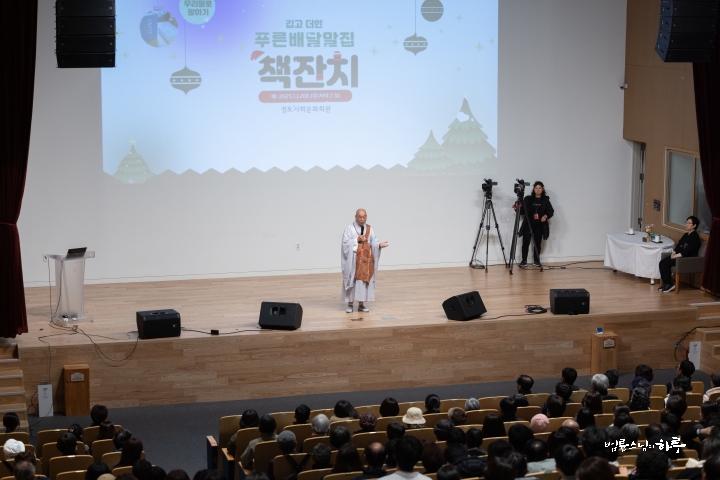
After liberation, when the compulsory elementary school education system was implemented in the late 1950s, almost all children began attending school. As a result, the Korean words used at home were replaced with new words learned at school. Through this process of changing all the vocabulary while maintaining Korean pronunciation, it has now become common to use these incorrectly changed words. Today, there are hardly any people who haven’t graduated from elementary school, are there? If there were someone who hadn’t attended elementary school and you spoke with them, they would use pure Korean words. However, through the elementary school education process, our language was completely replaced with Japanese-style vocabulary, and even I have become accustomed to it. Just as someone who has studied abroad for a long time uses English words for everything except particles, we too have become accustomed to using Japanese-style vocabulary.
With this awareness of the problem, Teacher Choi Han-sil, who has carried on the tradition of our Korean language, has refined Korean words for over a decade and published them as a dictionary as part of a movement to revive the use of our language. Teacher Choi Han-sil said to me, ‘If only Sunim and Jungto Society would use Korean words, it could have a tremendous influence.’ However, I am not someone who promotes the Korean language revival movement; I am someone who practices mind cultivation, so I cannot force you to use any particular linguistic expressions. (Laughter)
Anyway, I am pleased that this gathering has been arranged today. In support of Teacher Choi Han-sil’s initiative, Mr. Kim Je-dong has agreed to host today’s event. Please listen carefully to their conversation. Korean words come to us naturally without needing interpretation when we hear them. I hope that at least those who have come here today will help spread the use of our Korean language more widely.”
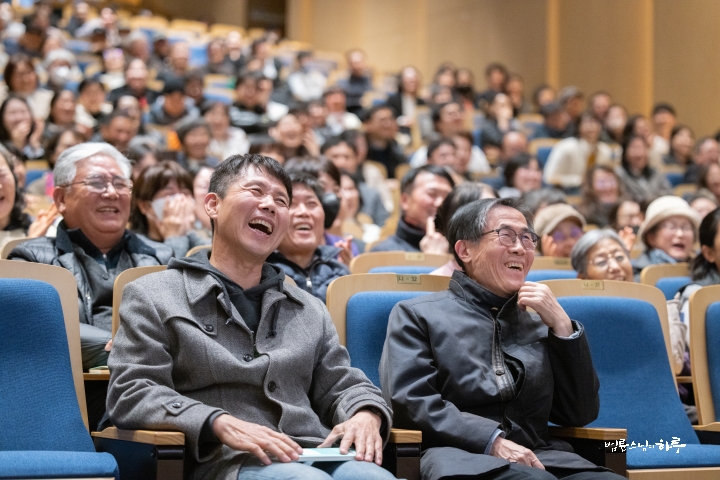
Next, Choi Han-sil and Kim Je-dong took the stage and began their conversation in earnest. Choi Han-sil spoke about the beauty of the Korean language and why we need to revive it, while Kim Je-dong enriched the discussion with his witty hosting.
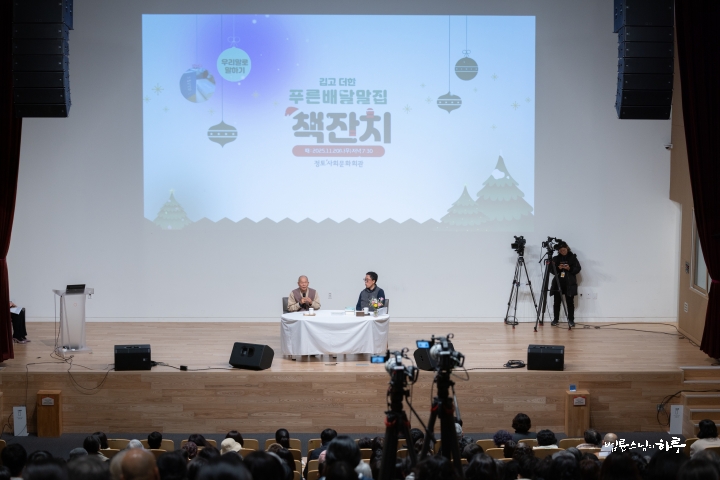
Their conversation unfolded engagingly around how to revive the Korean language. When Kim Je-dong raised the societal perspective of whether we really need to change the widely used Japanese-style coined words, Choi Han-sil countered that this was a dangerous viewpoint that would lead to losing linguistic sovereignty. He pointed out how Korean had been encroached upon by Japanese-style expressions across administrative, academic, and everyday domains since the colonial period. He reminded everyone of the historical significance of King Sejong and scholars first capturing the Korean language in written form, emphasizing how the inertia of foreign-style terminology persisted even after liberation.

“The reason we must revive our language is very clear. When we lost our country and lived in servitude, the administrative and academic language used by the Japanese became embedded throughout our lives, and even after liberation, not a single word changed. The Japanese words used by those in power, those who claimed to govern the country, continued to be passed down while the language used by the common people was gradually pushed aside. After compulsory middle school education was established, the spoken language of ordinary people was replaced by the Japanese words learned in school, and as newspapers, broadcasts, and books were all written in that language, our native language almost disappeared.
Why We Must Revive Our Language
We cannot fully appreciate how significant it was that King Sejong captured our language in written form and preserved it in works like Yongbieocheonga, even amid Chinese character dominance. If that intention had been carried forward, our language today wouldn’t be so distorted. Only when the language our children learn, the language that governs our nation, and the language that creates our laws and systems is the language of the people can our country stand properly.
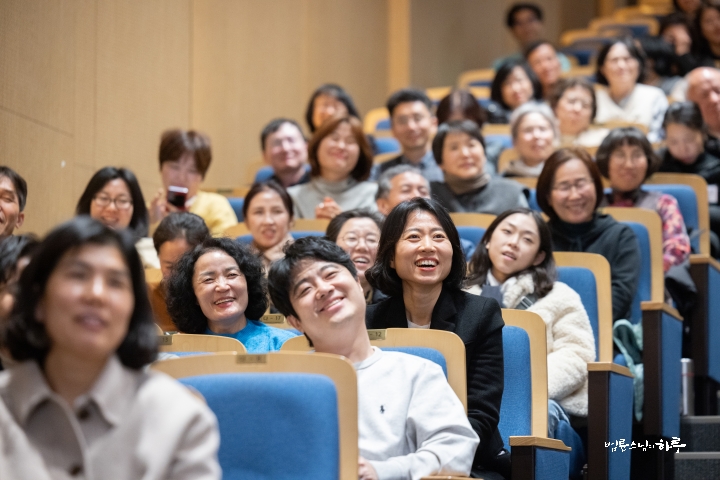
The same applies when looking to the future. Whether in academics or writing, ultimately everything must be in easy Korean that anyone can understand for it to be woven into the life of our people. When our language dies, the breath of our people weakens with it. That’s why if we don’t change things ourselves, starting with a single name or word, no one will do it for us. Just because everyone else uses Japanese words doesn’t mean we have to follow suit. The path for each person to become their own master ultimately begins with reviving our language.”
Kim Je-dong breathed life into the conversation, saying that the new words proposed by Choi Han-sil, such as gareumbo, geolbo, and malkkot, were actually more vibrant and touching.
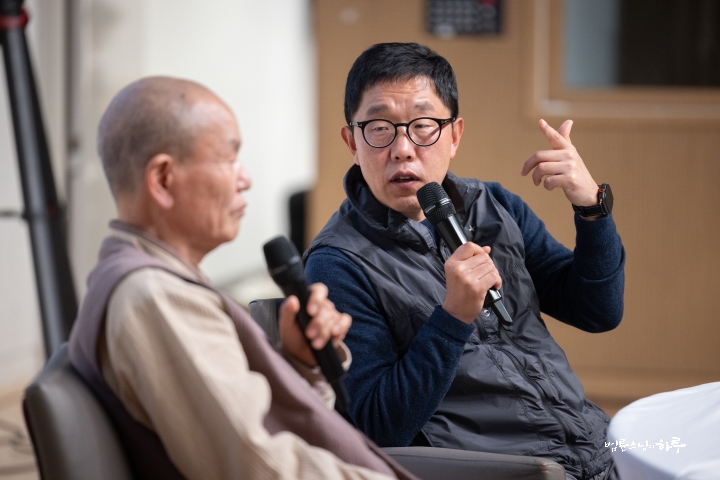
“For example, I think it would be wonderful to call a judge ‘gareumbo’ (one who divides/decides). Since they’re someone who divides what’s right, calling them ‘gareumbo-nim’ would make them less intimidating, and we’d just think ‘I see’ and stand up. Calling a prosecutor ‘geolbo’ (one who catches) makes it sound more friendly – ‘My son became a geolbo’ – and might reduce conflicts. Calling literature ‘malkkot’ (word flowers) is really beautiful too. Thinking of it as flowers blooming from words makes it much more touching. Actually, if these words spread, we’d be less intimidated by difficult words. The problem was that incomprehensible foreign words were made to seem superior. Words like gareumbo, geolbo, and malkkot create immediate mental images when heard and feel alive. I think these new words are very hip.”

The entire audience burst into laughter as they went through the process of correcting familiar foreign-style expressions. It was an opportunity to reflect on how accustomed we’ve become to foreign-style language.
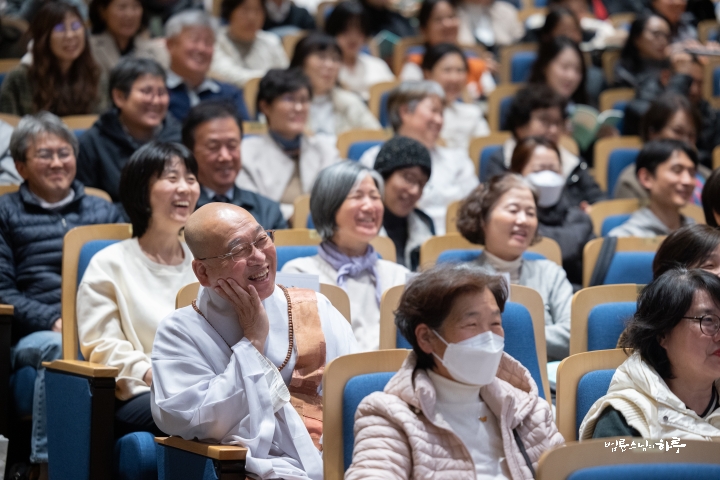
Choi Han-sil concluded the conversation by emphasizing that small practices like naming and everyday expressions are ultimately the path for each person to become the master of their own language, and that reviving our language is also a direction for future generations.
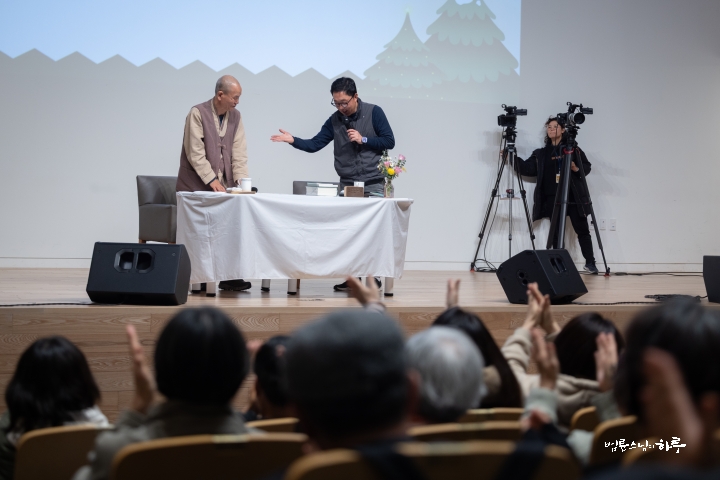
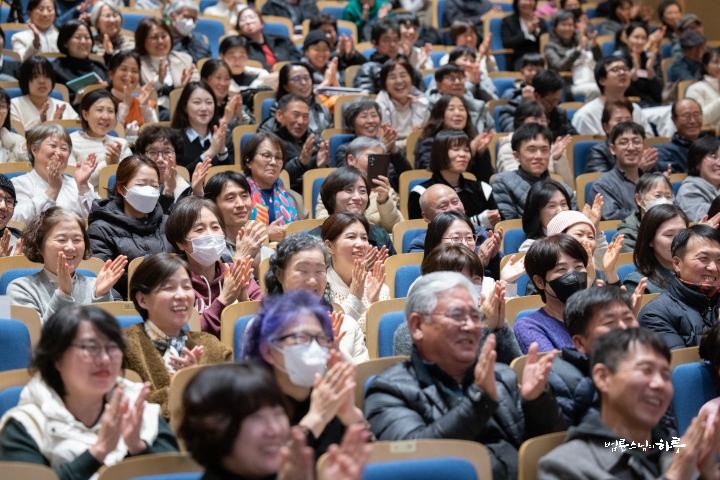
Following this, a book signing event for Choi Han-sil’s “Pureun Baedalmal-jip” (Blue Korean Language Collection) was held below the stage. Choi Han-sil personally wrote each person’s name in their book and once again urged everyone to take great interest in the Korean language.

After expressing gratitude to Choi Han-sil and Kim Je-dong for their passionate discussion, Sunim left the underground auditorium and headed straight to Dubuk Jungto Retreat Center.
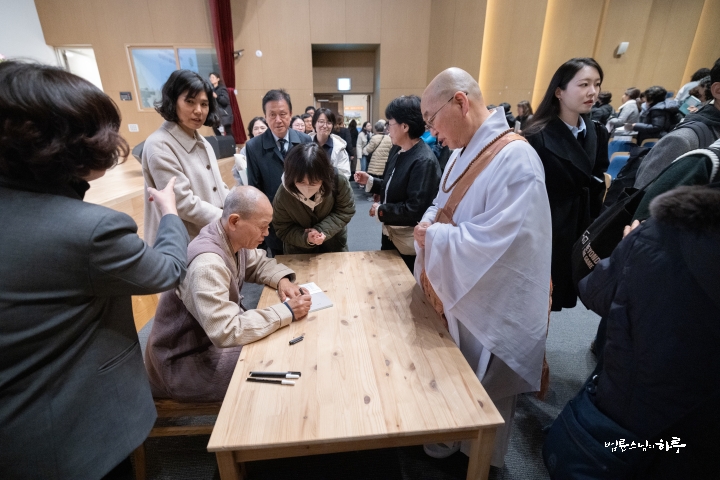
Departing from Seoul at 9:30 PM, they drove on the highway for 3 hours and 30 minutes. After arriving at Dubuk Jungto Retreat Center at 1 AM, Sunim concluded the day’s activities.

Tomorrow marks the beginning of three days of kimchi-making at Dubuk Jungto Retreat Center. In the early morning, they will prepare kimchi filling vegetables, harvest 1,000 heads of cabbage from the field in the morning, cut the cabbage and salt it in the afternoon, prepare radishes for seokbakji, and in the evening, Sunim will conduct the Friday Dharma Q&A live broadcast.





